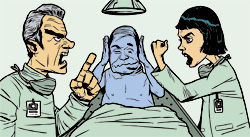Handling more than 2,000 bodies a year, as the King County Medical Examiner’s office does, has to have stressful downsides. That’s reflected in the Pill Hill morgue’s workplace turmoil in years past and by a testy exchange between a pathologist, Dr. Brian Mazrim, and a technician, Robinette Struckel, in the midst of an autopsy last year.
According to recently obtained copies of an investigator’s reports, a long-simmering dispute between the two came to a head during the dissection of a cadaver’s neck.
“You can go ahead and take the neck out now,” the doctor told the technician, according to the account.
“I’m sorry,” Struckel said sarcastically, “were we supposed to ask?”
“Yeah, everybody else does,” said Mazrim.
The tone of the exchange isn’t apparent in the reports. But Struckel, who’d been verbally sparring with Mazrim for several years, threw down her autopsy tools and left the examination room in tears, according to a witness.
What specifically caused their differences isn’t clear. But internal conflicts at the morgue had again reached the point that an outside workplace investigator had to be brought in. Erika Lochow of Keystone Consulting in Lynnwood, hired by the county at a cost of $8,225, spent months interviewing at least two dozen of the three dozen ME employees. She investigated complaints of more than a dozen hostile work incidents involving Mazrim and Struckel, and other employees, from 2005 through 2007, according to documents, marked “confidential,” recently obtained by Seattle Weekly.
It didn’t sound like a happy workplace. Employees used such terms as “drama queen,” “bitchy,” “anal retentive” and “control freak” to describe other workers. Said one, referring to a boss: “If his mouth is moving, he’s lying.”
Officials at the county’s Department of Public Health, which oversees the ME operation, won’t say much about the investigation. “We took the individual claims of our staff seriously,” health spokesperson James Apa said last week, “and acted on them promptly.”
The claims were similar to those made in previous years by workers in the understaffed ME’s office at Harborview Medical Center, where the county has paid out more than $150,000 over sexual-harassment claims and other job disputes (see “Death and Lapses,” SW, Jan. 14, 2004).
Experts have said there’s a comparatively unique workplace stress on the morgue’s living who tend daily to the county’s dead, toiling among the cooled remains as they attempt to determine the cause of any unnatural or suspicious death.
Because of the nature of the medical examiner’s work, incidents also tend to occur in macabre settings, such as the autopsy squabble. Dissent arose over an office photo contest a few years back, for example, which—likely rare among office photo contests—awarded $10 for the most gruesome picture of a dead body.
And it’s difficult to find an office theft elsewhere that compares to the one five years ago by a morgue janitor, who allegedly ran off with the remains of a newborn baby.
In the end, Lochow found the newest complaints didn’t add up to the legal definition of a hostile environment—the systematic, unwelcome conduct of others. But in two separate reports issued last September and October, the investigator tells of considerable unrest in a place of repose.
Mazrim, the pathologist who filed a workplace complaint against Struckel, the technician who ran out of the autopsy room, claimed Struckel’s behavior included “blowing up” and “badmouthing” him, according to Lochow’s report.
Struckel, who no longer works in the ME’s office, told Lochow she felt uneasy working around Mazrim because he gives off “passive/aggressive responses like ‘I don’t know’ and ‘I don’t care.'”
They accused each other of yelling at one another, and indicated their differences were causing co-workers to pick sides. The investigator found that some co-workers generally got along with Mazrim (“friendly but not social”), but not as well with Struckel (“sarcastic and short-tempered”).
While Lochow concluded she could not sustain Mazrim’s claim of a hostile work environment, she found that witnesses supported Mazrim’s accounts of the relationship, or lack of, between him and Struckel.
In a separate investigation, technician Struckel accused her boss, morgue program manager Greg Hewett, of creating a hostile work environment. In that case, Lochow interviewed 21 employees and compiled a 22-page report after Struckel raised nine allegations of hostilities.
They included intimidation, ethical violations, and improper training. She also alleged Hewett favored male employees over females. For instance, he allegedly felt, she said, that new trucks used by the ME’s office to transport bodies were just too big for women to drive.
But in an interview with Lochow, Hewett denied that, and indicated the trucks might be too big for anyone to drive safely. Regardless of who was operating the vehicles, he said, there had been three accidents in six months, whereas accidents with the older vans occurred only once every three or four years.
If the workplace wasn’t “hostile” according to the legal definition, there were hostilities nonetheless, Lochow found. She recorded pages of candid observations by employees given the chance to anonymously spout off about others, including their immediate boss, Hewett. (He’s second in command to Chief Medical Examiner Richard Harruff).
Hewett “knows how to smile,” said one, but has “a problem with honesty,” said another. He also “cleaned up the corruption” but he’s a “bit of a dictator,” said others. In the end, Lochow found the reviews of Hewett “mixed.”
Struckel, the complainant, came in for a bit of a drubbing, however. Though a hard worker, she’s “difficult,” “divisive,” and “thinks everyone is out to screw her,” the report quotes co-workers. She departed after the report was issued.
Neither Hewett nor Mazrim wished to discuss the findings last week. Struckel could not be reached for comment. Health spokesperson Apa says the reports speak for themselves, and “We consider this issue closed.”








